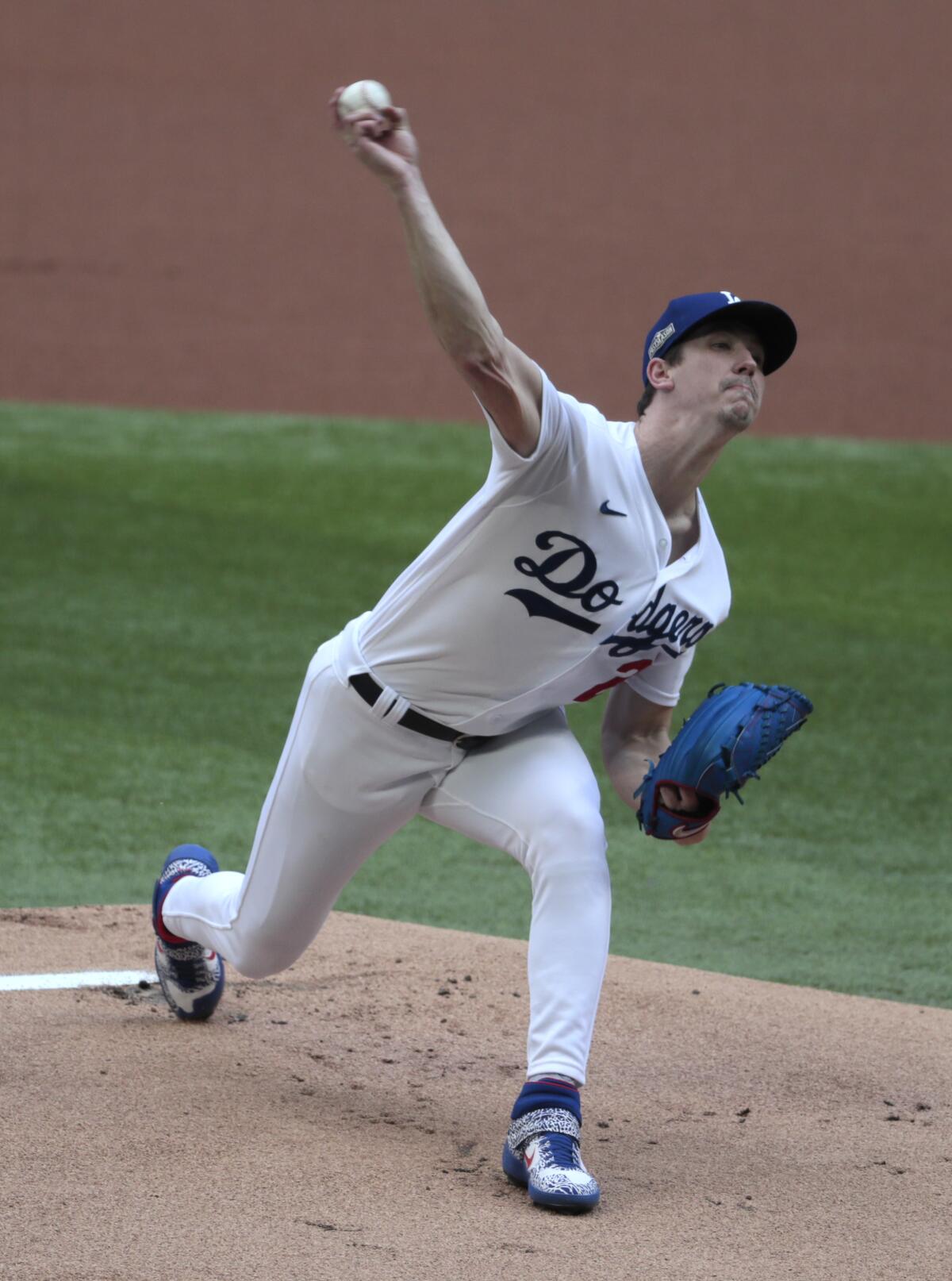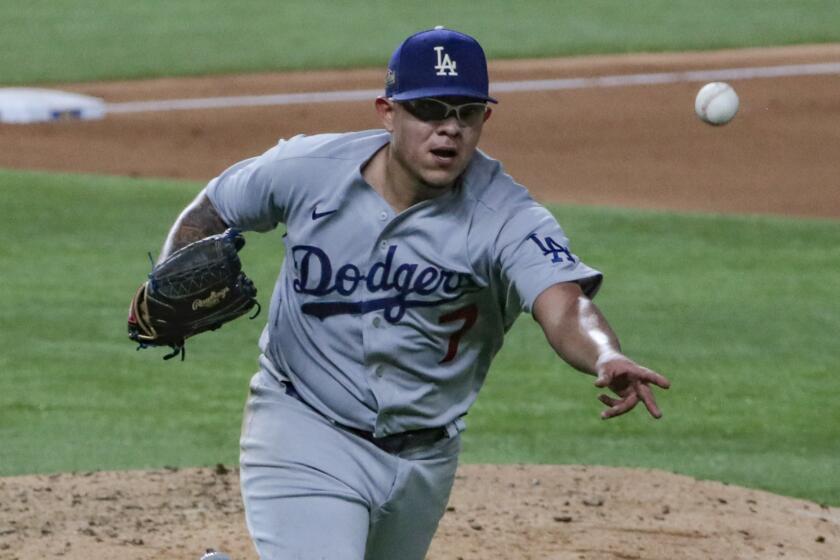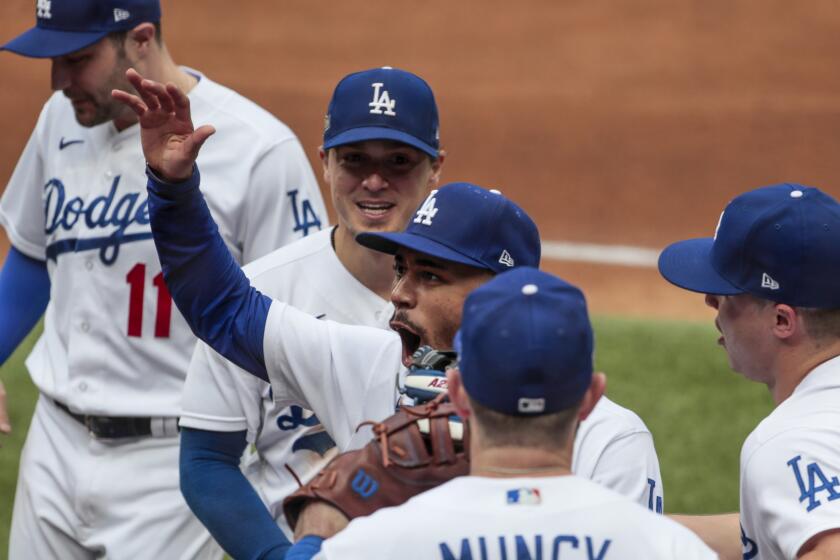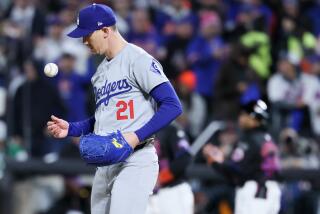Walker Buehler’s unshakable confidence comes from repeated tests at Vanderbilt
- Share via
ARLINGTON, Texas — The game is called “skins” — a staple of offseason practices for Vanderbilt University’s baseball team.
The rules are complex, but the idea is simple. Every inning begins with the pitcher and the defense facing specific leverage situations. Sometimes there is a runner on second. Sometimes the bases are loaded. The point is, there is always tension. Always pressure.
“If we played nine innings,” Vanderbilt coach Tim Corbin said, “there would never be an inning where a pitcher would start without traffic — he would be sideways the entire time.”
This is where Walker Buehler received some of his most important lessons as a pitcher, back before he was a first-round pick, an up-and-coming star in the Dodgers rotation, or one of MLB’s best big-game performers — a distinction that will be tested again when he starts Friday in Game 3 of the World Series against the Tampa Bay Rays.
During his college days, it was in this drill that he threw some of his most stressful pitches.
It was here, he said, that he first learned how to fail.
The Dodgers lost to the Tampa Bay Rays in Game 2 of the World Series, but they got a win by keeping their stable of top starters rested for another game.
“There’s a lot of failure and a lot of manufactured failure, making things tough on yourself so that the normal stuff kind of sounds easier,” Buehler recalled this week.
“Coach Corbin there, obviously, is one of the better coaches at any level in the country and just puts you in tough positions and lets you fail and lets you learn from it. It just made it tougher on me. Then you kind of grow out of that.”
It’s an unusual topic to hear a pitcher as distinguished as Buehler discuss, an unexpected reflection upon some of the hardest moments in his career.
Yet, as this postseason has progressed, with Buehler improving every start, the 26-year-old has referred back to those painful memories: the grand slam he gave up in Game 3 of the 2018 NLDS in Atlanta; his stumbles during three straight NCAA tournament runs at Vanderbilt; the highs and lows of skins games that felt far more important than routine practice drills.
Each low point was a prerequisite to his career’s current heights, dark days that better equipped him for a bright future.
“I failed in those moments,” Buehler said. “I can handle that failure. I’ve been through it and I’ve been good after it. That failure doesn’t really scare me anymore. Obviously, you don’t want to fail. But there’s a different feeling when you’re not scared of that failure.”
::
Corbin could tell Buehler was locked in by the way he handled his news conference.
It was 2014 and Vanderbilt had reached the College World Series despite a short three-inning, four-run , seven-hit start from the right-hander in the Super Regional round a week earlier.
In an otherwise stellar sophomore season that saw Buehler put on weight, turn his low-90s fastball into an upper-90s scorcher and cement himself as a potential first-round prospect, that Super Regional outing had been one of his worst of the year.
The failure bothered him. He wanted to fix it.
“He was a little bit chippy, his answers were short, he was not screwing around,” Corbin recalled of Buehler’s pre-CWS media session, an uncommon edge to a player who mostly keeps a low-key persona. The coach got excited.
“That’s the level of temperature that you need to get to with him,” Corbin said, “in order to get the best out of him.”
Vanderbilt was trailing 4-2 in the second game of the tournament against UC Irvine when Buehler entered in the fourth inning, inheriting runners on first and second. It was just like skins. He escaped the inning, then pitched five more without giving up a hit. The Irvine coach said facing Buehler “felt like a root canal.” Corbin’s voice still rises an octave remembering that night.
“He just attacked that moment,” Corbin said by phone this week. “You see kids when they get in certain environments and they thrive on them — that’s him.”
It’s the same attitude Corbin has seen throughout Buehler’s pro career, from the pitcher’s scoreless outing against the Colorado Rockies as a rookie in Game 163 of the 2018 season, right through to his winning start in Game 6 of last week’s NLCS, when he escaped a bases-loaded, no-outs jam en route to six scoreless innings against the Braves.
“This sounds very odd,” Buehler said after that win, “I’ve never felt that calm in a baseball game in my career, especially in a spot like that.”
Days later, he explained why.
“I’ve had bases loaded with not many guys out against the Atlanta Braves in the playoffs before,” Buehler said, referencing the grand slam he yielded to Ronald Acuña Jr. in his playoff debut in the 2018 NLDS — one of only two starts in Buehler’s 10-game playoff career in which he’s given up more than two runs.
“I think there’s a confidence element to it and I can’t explain it. I didn’t feel any sort of anxiety or panic that you may usually. It’s something that kind of comes in waves. But that one I felt good.”

His college coach has a theory. Buehler had failed in a similar situation before. He wasn’t going to do it again.
“He’s not one of those kids that is going to look at a loss and say, ‘I don’t remember that,’” Corbin said. “He remembers exactly what it was, when it was, the pitch he threw. It just doesn’t sit well. There’s a redemption piece to him that’s very vivid, very important.”
::
Before Buehler’s starts now, particularly the playoff games for which he has earned such a lofty reputation, Dodgers manager Dave Roberts looks for different characteristics out of his ever-maturing pitcher.
The temperature is slightly turned down, even if the focus remains the same.
“I think, probably, he’s talking,” Roberts said. “My time knowing Walker for all these years, he’s just easygoing, always. If he came in like Clayton [Kershaw] on his start day, I would be a little bit more concerned. Walker comes in and ramps up his focus.”
To Roberts, it’s a sign of growth, a signal of confidence. His pitcher doesn’t need to get so amped up anymore. He’s been through enough “experiences” — Roberts prefers that word to “failures” — to know how to handle suffocating situations.
“He’s very introspective, he’s very intelligent, he’s very competitive,” Roberts said, adding, “He’s just very good about understanding what happened and how he can get better.”
And just as the 2018 grand slam was a learning experience for his bases-loaded jam last week, there is a moment from Buehler’s college career that could serve as training for his second career appearance in the World Series on Friday.
After Buehler’s hitless relief appearance in 2014 helped Vanderbilt eventually win a national title that year, the program looked poised to repeat as champions in 2015, when Buehler anchored the rotation in his junior season.
Their College World Series Final that summer went down to a decisive winner-take-all third game. Vanderbilt jumped out to an early 2-0 lead against Virginia. And they had Buehler on the mound to close it out.
But in the fourth, Buehler walked the leadoff hitter, then gave up a two-run homer in the next at-bat. He didn’t make it out of the inning. It was the last of his college career. Virginia went on to a 4-2 come-from-behind win. Buehler felt responsible.
No huge roster surprises as the Dodgers try to ensure they have enough pitchers for a potential seven-game World Series against the Tampa Bay Rays.
Of course, it wasn’t all his fault. The pitcher had been a workhorse in the postseason. And barely a month later, the Dodgers, who drafted him 24th overall that June, discovered he needed Tommy John surgery.
Yet, during his exit meeting with Vanderbilt coaches a few days after, he was still digesting what had happened, learning again about the fine margins that dictate baseball’s biggest stages.
“That situation maybe bothered him more than anything,” Corbin said. “If you take all the games where, in his mind, he came up short, that probably is the one that would leave a scar.”
But, like all the other setbacks in his career, it was a wound from which Buehler came back stronger. A memory that was stored away. A failure that strengthened his resolve.
“I have failed on some pretty big stages,” Buehler said. “I know it sounds cliche, and that’s not how I like to talk about it, but in this case, I think learning from your failures and believing that, because of that, you can succeed is a huge deal.”
More to Read
Are you a true-blue fan?
Get our Dodgers Dugout newsletter for insights, news and much more.
You may occasionally receive promotional content from the Los Angeles Times.













